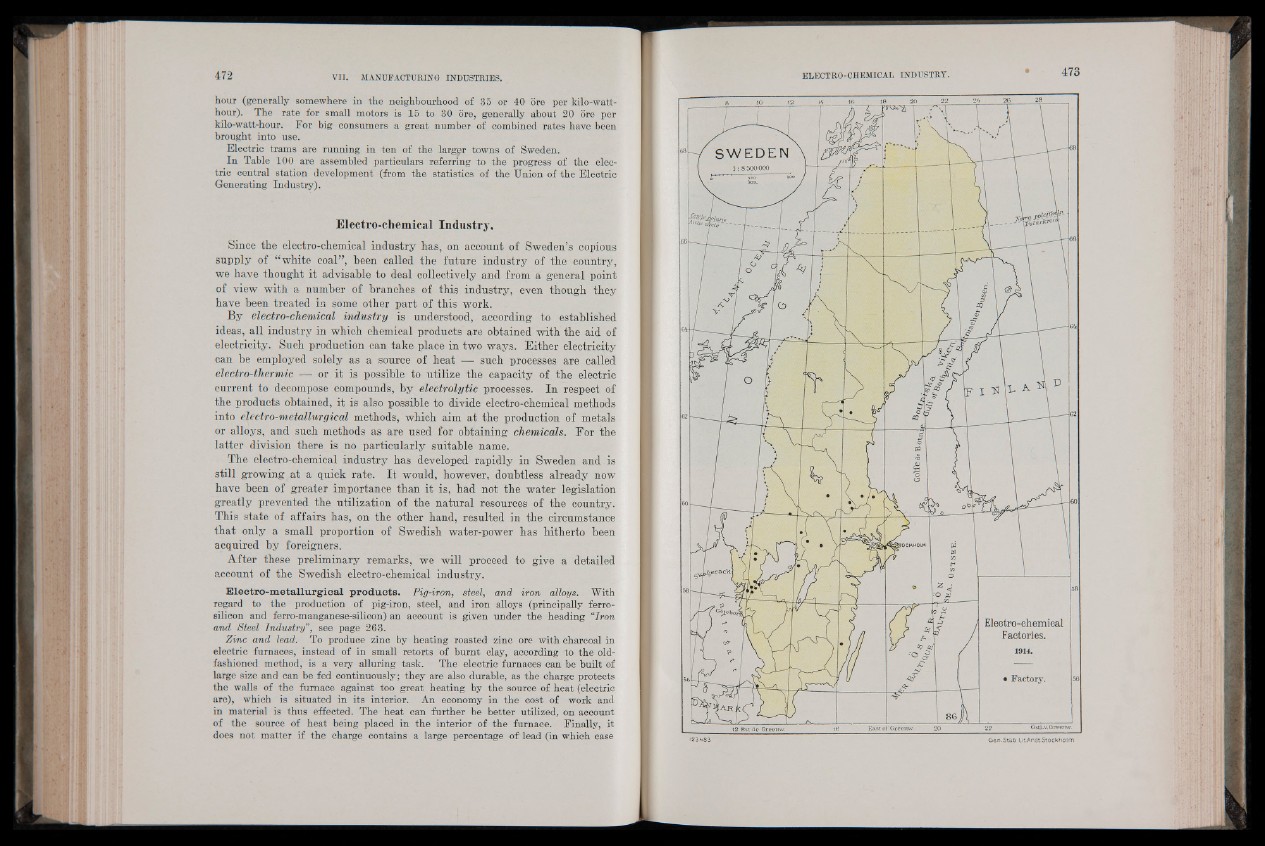
hour (generally somewhere in the neighbourhood of 35 or 40 ore per kilo-watt-
hour). The rate for small motors is 15 to 30 ore, generally about 20 ore per
kilo-watt-hour. For big consumers a great number of combined rates have been
brought into use.
Electric trams are running in ten of the larger towns of Sweden.
In Table 100 are assembled particulars referring to the progress of the electric
central station development (from the statistics of the Union of the Electric
Generating Industry).
Electro-chemical Industry.
Since the electro-chemical industry has, on account of Sweden’s copious
supply of “white coal”, been called the future industry of the country,
we have thought it advisable to deal collectively and from a general point
of view with a number of branches of this industry, even though they
have been treated in some other part of this work.
By electro-chemical industry is understood, according to established
ideas, all industry in which chemical products are obtained with the aid of
electricity. Such production can take place in two ways. Either electricity
can be employed solely as a source of heat —• such processes are called
electro-thermic — or it is possible to utilize the capacity of the electric
current to decompose compounds, by electrolytic processes. In respect of
the products obtained, it is also possible to divide electro-chemical methods
into electro-metallurgical methods, which aim at the production of metals
or alloys, and such methods as are used for obtaining chemicals. Eor the
latter division there is no particularly suitable name.
The electro-chemical industry has developed rapidly in Sweden and is
still growing at a quick rate. It would, however, doubtless already now
have been of greater importance than it is, had not the water legislation
greatly prevented the utilization of the natural resources of the country.
This state of affairs has, on the other hand, resulted in the circumstance
that only a small proportion of Swedish water-power has hitherto been
acquired by foreigners.
After these preliminary remarks, we will proceed to give a detailed
account of the Swedish electro-chemical industry.
Electro-metallurgical products. Pig-iron, steel, and iron alloys. With
regard to the production of pig-iron, steel, and iron alloys (principally ferro-
silicon and ferro-manganese-silicon) an account is given under the heading “Iron
and Steel Industry”, see page 263.
Zinc and lead. To produce zinc by heating roasted zinc ore with charcoal in
electric furnaces, instead of in small retorts of burnt clay, according to the old-
fashioned method, is a very alluring task. The electric furnaces can be built of
large size and can be fed continuously; they are also durable, as the charge protects
the walls of the furnace against too great heating by the source of heat (electric
arc), which is situated in its interior. An economy in the cost of work and
in material is thus effected. The heat can further be better utilized, on account
of the source of heat being placed in the interior of the furnace. Finally, it
does not matter if the charge contains a large percentage o f lead (in which case
12 E st de Greetiw. 16 E a st o f G re e iw. 20 22 OstLv. Greenw.